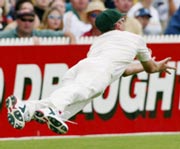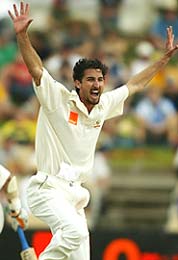

Australia just too good
Australia has raised its standard another notch. England has utterly
failed to respond to the challenge of playing a difficult game against a
hard team on firm surfaces. A wounded side has been broken. Notwithstanding
fitful resistance and occasional sprinklings of rain, the last rites did not
take long. Alec Stewart contributed a typically brisk effort in a losing
cause but the tail lasted as long as the Maginot Line. Apart from The Barmy
Army, the Poms went quietly to their fate.
Glenn McGrath's catch pinpointed the continuing strength of this Australian
outfit. England's fifth-wicket pair had been mounting the sort of defiance
expected from determined men with their backs to the wall. After taking an
early wicket, Steve Waugh's team had been frustrated for 100 minutes as the
clouds grew more threatening. Shane Warne had been bowling around the wicket
to Michael Vaughan, a mark of respect for an accomplished opponent. Clearly
the leg-spinner and vintner remembered the punishment he had taken from this
batsman in the first innings and wanted to hold him in check.
 Click for bigger image
Click for bigger image
|
After an hour or so of stalemate, Warne went over the wicket and the
Yorkshireman seized his chance with a sweep, placed into the region forward
of square. Hitherto, McGrath had been patrolling the area behind the umpire,
a tranquil location where a man might graze without fear of interruption.
Had the lofty paceman fallen asleep he might have been forgiven. Had he
missed the start even harsher critics would have understood. Instead, McGrath
sniffed an opportunity and set off like a giraffe. He does not so much
run as gallop. Arms and legs fly in all directions. The operation takes more
organising than a child's party.
Meanwhile, time stood still in the stands as the parabola of the ball was
followed as if it were a golf ball approaching a green. Warne stood in
position, his hopes fading as the distance between ball and pursuer and
the identity of the fieldsman became apparent. None of the news was
encouraging.
McGrath was not so easily deterred. Upon reflection it is hard to recall him
grassing a catch, but he gets lumbered with the image of the big-booted
paceman dropping catches. Certainly the pessimists
were predominant as the fateful moment approached. Long odds were being
offered against the ball being reached let alone held. Then came a blur, a
dive, a long man stretching to grab a ball an inch from the turf, a
landing, a slide and then astonishment in the stands and delight on the
ground. McGrath rose, grinned and dusted himself off with the air of a man
offended that his prospects had been doubted.
It was only a moment but it told a story of one team rising and another
overwhelmed. An important wicket had been taken. Australia had not needed a
second invitation. It was not the only telling moment in a match that owed
its brief competitiveness to Vaughan's impressive effort.
As significant was the sight of Andrew Bichel twice striking in the final over of a day,
removing Vaughan and the visiting captain no less with thrusts that did
terrible damage to English morale.
Bichel is not the best bowler ever to wear
a green cap but he played his part with bat and ball and will remember those
wickets till his dying day.
Players improve in this Australian team. Limited
cricketers start to resemble Popeye after a helping of spinach.
 Although unloved by the romantics, these Australians are fun to watch.
McGrath, Warne, Adam Gilchrist, Waugh and, latterly, Matthew Hayden are
players of the highest class. Nowadays, though, the team is powerful in
almost every position. Indeed, the side has more pillars than St Paul's
cathedral, and these reach to the top.
Although unloved by the romantics, these Australians are fun to watch.
McGrath, Warne, Adam Gilchrist, Waugh and, latterly, Matthew Hayden are
players of the highest class. Nowadays, though, the team is powerful in
almost every position. Indeed, the side has more pillars than St Paul's
cathedral, and these reach to the top.
Ricky Ponting has become a fine
batsmen, capable of heavy scoring even when his feet are not working
properly. Brilliant at The Gabba, he was subdued in Adelaide and still
scored a big hundred.
Jason Gillespie has also become a magnificent
cricketer. Indeed he has provided the cutting edge in these first Tests and
might have taken even more wickets. Gillespie and McGrath are far and away
the best fast bowlers around. Not that the competition is hot. Few teams in
the history of the game have had at their disposal three bowlers of this
calibre.
Waugh's captaincy also deserves recognition. Actually he was not at his
sharpest on a fourth day, played in the sort of atmosphere favoured for
dramatic purposes by the Bronte sisters. Australia might have made better use
of its pace bowlers in the morning. Otherwise, he deserves credit for
maintaining the ambition of his team. After many hard years on the road the
Australians remain hungry. None of them needs the money, though Mrs Lehmann
and Mrs Bichel might not concede the point.
This has been a victory for a broad and well-managed outfit. These
Australians are more civilised than has been supposed. Their hotel resembled
a creche this week and early risers were in danger of bumping into a
celebrated wicketkeeper in hot pursuit of a baby cheerfully exploring the
corridors. Waugh has played an enormous part in the development of this side
and its players and should not lightly be cast aside. By trying to become
multi-layered he has taken his players on a journey that has brought many
rewards.
Happily there has been no hint of sledging in either of the Tests. Obviously,
the Australians have not suddenly become Trappist monks but neither did
anyone overstep the mark. In the light of bad-tempered exchanges in South
Africa last week, this point is worth making. Australia won fair and square.
Waugh's team played superb cricket and crushed an opponent unable to provide
strong opposition on or off the field.
The story of the Ashes - Mohandas Menon
Also read: England must drop the aged and ordinary
More Columns
Mail Peter Roebuck